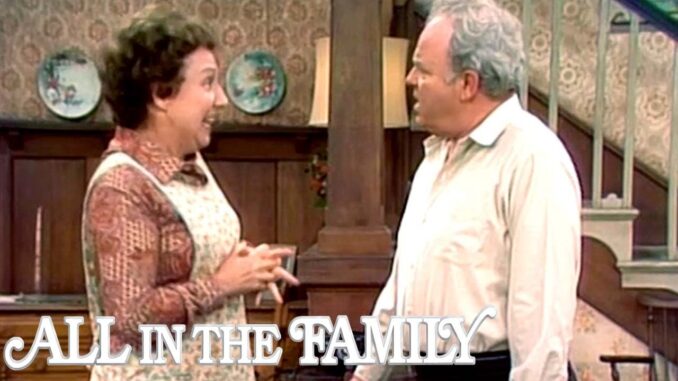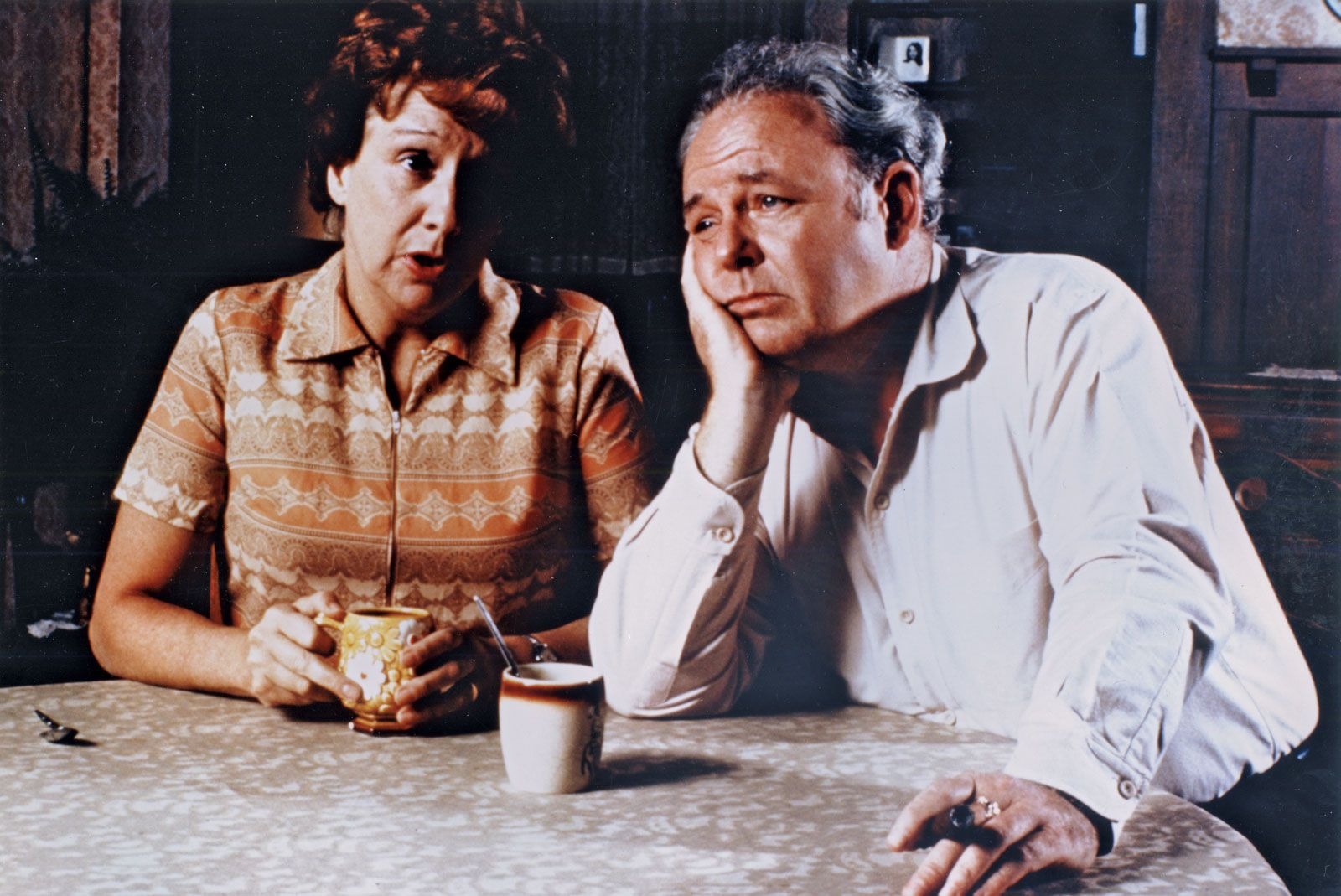
 CHICAGO (MarketWatch) — “All In the Family” stands as the seminal television show of the 1970s because it works on three brilliant levels: as an uproarious comedy in the classic sitcom tradition, as a blistering social satire and as a first-rate character study. The complete series, which aired on CBS from 1971 to 1979, has recently been released in a deluxe 28-disc DVD box set by Shout Factory, which licensed the show from Sony Pictures Home Entertainment .
CHICAGO (MarketWatch) — “All In the Family” stands as the seminal television show of the 1970s because it works on three brilliant levels: as an uproarious comedy in the classic sitcom tradition, as a blistering social satire and as a first-rate character study. The complete series, which aired on CBS from 1971 to 1979, has recently been released in a deluxe 28-disc DVD box set by Shout Factory, which licensed the show from Sony Pictures Home Entertainment .
Priced at $180, the set includes a wide variety of extras, including a new interview with creator Norman Lear, a 40-page book with essays by USC professor Marty Kaplan and TV critic Tom Shales, two documentaries on the series, both of the show’s pilot episodes, the pilots of spinoffs “Gloria” and “Archie Bunker’s Place,” and more. What may be overlooked about “All In the Family” is that for all of its frank discussion of race, politics and gender issues, under creator Norman Lear it was constructed in the very best tradition of television comedy.
“In a world of so many TV shows, you’ve got to do something that catches the viewer’s attention,” said Tim Brooks, long-time media research expert and co-author of “The Complete Directory to Prime Time Network and Cable TV Shows, 1946-Present.” “At the same time, if you get somebody to watch you because of that, there has to be a ‘there’ there. It can’t just be a gimmick. This one kept the buzzworthiness up because it had episodes that made people say, wow, did you see that?”
A classic sitcom
Many of the funniest episodes are riffs on time-honored sitcom plots, as when Archie hatches a scheme that inevitably backfires, or takes a blustery, wrong-headed position on some burning issue that proves to be false. In these segments, Archie almost seems like an updated, more politically outspoken version of “The Honeymooners” Ralph Kramden. Carroll O’Connor was a great admirer of Jackie Gleason, and on a few occasions, “All In the Family” writers borrowed “Honeymooners” plots and made them over in the image of the Bunker patriarch. One of the “Honeymooners” episodes to air in the 1956-57 season was “Forgot to Register,” in which Ralph (Gleason) exhorts Norton (Art Carney) to vote in a local election by delivering a stirring speech about the Pilgrims, only to be unable to cast a ballot himself because he hasn’t registered.
In the season 2 “All In The Family” episode “The Election Story” (aired Oct. 30, 1971), Archie is infuriated by a liberal candidate in a local election, Claire Packer. Mike and Gloria are strong supporters of Packer’s, and they invite her to the house, resulting in an archetypal “All In the Family” discussion about women’s liberation, welfare, the nuclear arms race and more. See the 10 best “All in the Family” episodes.
This is also the episode in which Archie looks at a ballot of candidates with different ethnicities. “Salvatore, Feldman, O’Reilly, Nelson — that’s an Italian, a Jew, an Irishman and a regular American dere,” he says, talking to Mike. “That’s what I call a balanced ticket.”
Archie hadn’t planned to vote (“I save my vote for the biggies,” he said, referring to presidential elections), but decides to make an exception here just to oppose Packer. When he gets to the polling place, where Louise Jefferson is volunteering, his name isn’t on the rolls because he hasn’t voted since 1960.
“The ‘All In the Family’ writers worked within traditional plot lines, and this was important for the audience,” said Jeffrey McCall, a professor of media studies at DePauw University, “because they could recognize the structure of a sitcom. But then they would get a different perspective on some of those structures.”
Social satire
Through the show’s first four seasons, the character of Lionel Jefferson proved a constant source of inspiration for “All In The Family’s” writers as they sought different ways to take on the issue of race.
Lionel (Mike Evans, in his first acting role) makes deliveries to the Bunker home from Jefferson Cleaners, and from the beginning he needles Archie, having fun with the old man’s absurd beliefs about blacks. In the first season’s “Archie Gives Blood,” (Feb. 2, 1971), Archie assumes that one should only give blood to someone of the same race, so when he sees Lionel at the blood bank, he tells Mike, “I bet he’s down here to do some kind of an odd job, right Lionel?” Lionel, tugging on the lapels of his jacket in pseudo-pride, smiles. “Uh yeah, I sweeps up,” he says, putting on a stereotypical dialect.
By Season 3, Archie has largely caught on to Lionel’s game, responding to jabs of this kind with something like “Cut the funny stuff, hah?” This grounds their relationship to some degree, and there’s always the sense that the characters get along fine.
That’s what creates some tension in “Lionel Steps Out” (Oct. 14, 1972), the story of what happens when Lionel goes dancing with Archie’s niece, Linda, who is visiting the Bunkers. Director John Rich, who helmed nearly 100 episodes of the series, turns in a tour de force, getting lots of comedic mileage out of a single prop, a framed photo of Lionel and Linda.
Archie goes ballistic when he finally discovers the situation, and takes the young man into the Bunker kitchen. “You know what I mean, Lionel. I’m sayin’ whites ought to stay with whites and coloreds ought to stay with coloreds.”
Lionel leans back, sighs, and stands up. Writers Michael Ross and Bernie West decided that this would be a good time for a line to be drawn in the sand. “Look, Mr. Bunker. It’s been a year and a half since I moved into this neighborhood. I was just 19 then, and I got a big kick out of you and me for a long time. But I’m pushing 21 now, and I’m not getting that big a kick out of it any more.”
Archie holds up his hand. “All right now, Lionel. Put a lid on that.”
“No, now let me finish, now. Now we’re friends, and we can go on being friends. But when it comes to black, and white, and all the other wonderful thoughts you have in between — put a lid on that, Archie.”
This episode delivers on all three of the show’s levels. It’s hilarious, offering borderline slapstick and funny verbal exchanges, makes a strong statement against bigotry and shows us interesting character development (Lionel’s).
Character development
There was great controversy over whether “All In The Family” actually promoted bigotry by making it seem so funny. The concern was that people who agreed with Archie would feel like they had more permission to use racial and ethnic slurs because they were used so casually on the show.
“There was evidence that it reinforced, for certain members of the audience, Archie’s point of view,” said McCall. “But I always thought ‘All In The Family’ was like [New York] Yankees baseball broadcasts on TV. You had a lot of people who tuned in to see Archie get his comeuppance, but others would watch to see Archie dish it out to Mike. And that’s how it was with the Yankees. People who liked the Yankees and people who didn’t like the Yankees all wanted to watch.”
Brooks agrees. “The genius of any creative work, really, is that it can be taken in different ways.”
Archie was no one-dimensional character. “Even if you disagreed with him, it was hard to dislike him,” Brooks observed. “He obviously loved his wife and his daughter, but he was like an old cranky uncle. So he had sympathy to him.”
The writers gradually revealed Archie’s backstory. He was a deprived child of the Depression era, belted around by his father, taught racist views by him, and forced to leave school early to support the family. These aspects, combined with O’Connor’s appealing portrayal, made it possible to believe that Archie could change, as he did during the program’s nine seasons.
Other than Archie, though, the most interesting character is Mike Stivic. While Mike mouths most of the series’ progressive talking points, the writers are careful to point out his hypocrisies. When a black applicant is given a job in Minnesota that Mike had coveted, in “Mike’s Move” (Feb. 2, 1976), he questions the validity of affirmative action, much to Archie’s delight, in another example of the show’s clever riffs on a controversial issue.
“Ohhhh! It turns out you’re the guy that’s against the coloreds. I never was,” Archie says.
“Mike was someone who was dedicated, and meant well, but he’s still in a sense a kid, even though he was a young man,” Brooks said. “Those who wanted to say ‘Look how dumb he is’ could say that, and others who wanted to say, ‘Yeah, but he stands for the right things’ could say that too. That ability to kind of see yourself in the character was part of what worked.”
Television legacy
“All In The Family’s” legacy as a landmark of TV comedy is beyond dispute. It is often said that such a sitcom could never be seen on broadcast television today (cable is a different animal). McCall agrees, to some extent.
“It would be hard to put it on one of the Big Four due to the ethnic humor, because I think a lot of people don’t want to see that,” he said. “But in terms of the insult humor, the verbal slams, we see a lot of that on TV now. So I don’t think the style would be a problem.”
